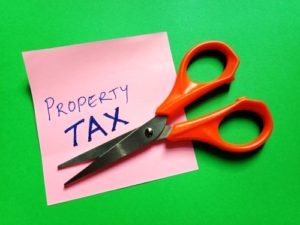Serenity Now!
Revenue Committee Chair, Lou Ann Linehan, stepped-up her game at a press conference last Wednesday. She outlined a legitimate property tax plan that would shift some costs for funding K-12 and community colleges from property taxes to sales taxes. The product is a collaboration between Senator Linehan and Education Committee chair, Mike Groene. LB289 will be the vehicle. The bill is on General File and an amendment to the bill will have a public hearing at 4pm on April 24.
“I’m out there Jerry, and I’m LOVIN’ every minute of it!”
Linehan’s seven other committee members stood behind her at the press conference. None of them spoke, but it was obvious there is dissension in the ranks.
“The sea was angry that day my friend, like an old man trying to send back soup in a deli.”
Predictably, the Governor dislikes what he heard. He says it’s a tax increase.
“No soup for you!”
In a nutshell, an amendment to LB289 would reduce property valuations on agricultural land from 75% to 65%, and reduce residential and commercial valuations from 100% to 90%. PLUS, lowering property valuations can also result in lower taxes collected by cities, counties, natural resource districts, etc.
“Not that there’s anything wrong with that!”
To balance a property tax reduction, an amended LB289 would raise tax on a pack of cigarettes by 36¢ / eliminate sales tax exemptions on pop, bottled water, candy, veterinary services for pets / plumbing / HVAC / storage and moving services / transfers $51 million from on-lines sales tax collections. The amended LB289 would use the Consumer Price Index (CPI) to restrict school spending.
“A Festivus for the rest of us.”
Public schools and community colleges hate the idea. Cities and counties hate it just as much. They each have significant influence with senators, as well as very effective lobbyists who are currently on high schmooze alert.
“Jerry, just remember, it’s not a lie if you believe it.”
Overtaxed property owners like farmers, homeowners and commercial property owners would stand to finally receive relief. But who represents them? Agriculture Associations have representation, but homeowners and commercial property owners have few advocates on the front line.
“GET OUT!”
On Thursday (April 25), the Economic Forecasting Advisory Board meets to provide an advisory forecast of general fund receipts that is used by the Legislature to craft the state’s budget. The Appropriations Committee will factor that information into their proposed budget that must be delivered to the Legislature by May 2.
“These pretzels are making me thirsty.”
NeABA Bill In Play
Select File
- LB227 (Hughes) Nuisance bill. If a farming operation existed prior to changes in surrounding land use remains unchanged a farm or warehouse could retain right-to-farm protections for changes to the farming operation or public grain warehouse operations. A farm or warehouse shall not be found to be a nuisance if reasonable measures are employed to minimize dust, odors, etc. and the farm or grain warehouse complies with applicable laws and regulations, including zoning; and there is no significant change in the operation, the farm or warehouse has been in operation more than 1 year and was not a nuisance when it began.
Advanced to the Governor
- LB320 (Albrecht) Brings provisions of the Pesticide Act into alignment with revisions to the Certification of Pesticide Applicators Rule, which establishes standards for state programs to certify persons applying restricted use pesticides (RUPs), training/competency to be demonstrated by applicators to obtain certification and licensure, and related record keeping. The revisions increase Federal applicator certification program standards, enhance pesticide safety training and standards for supervision of noncertified applicators, and establish a minimum age requirement for noncertified applicators using RUPs under the direct supervision of a certified applicator. States have until March, 2020 to submit to EPA revised certification plans that comply with the updated rule requirements.
Approved by the Governor
- LB243 (Gragert) Creates the Healthy Soils Task Force to develop a comprehensive healthy soils initiative, and an action plan to carry out the initiative using specified standards as measures to assess improved soil health. With the assistance from outside resources, the task force shall examine how to provide farmers with research, education, technical assistance, and demonstration projects; examine options for financial incentives to improve soil health; and examine the contribution of livestock to soil health. The task force is to create a timeline to improve soil health within 5 years after completion of the action plan. The task force shall submit its action plan, as well as their findings and recommendations, by January 1, 2021. There are two slots on the committee for agribusiness members.
- LB284 (McCollister) Internet sales tax collection bill requires remote sellers (those without a physical presence in the state) and/or “marketplace facilitators” to collect and remit sales tax beginning July 1, 2019 if their gross revenue from sales into the state exceed $100,000, and sales into the state exceed 200 or more separate transaction in the same time period.
